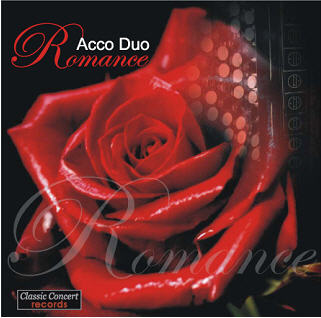The Free-Reed Review
Critiques of Compact Discs, Books and Music
Scores
CD Review: Acco Duo—Romance
 total time: 50:30
total time: 50:30
review date: November 2010
Acco Duo's website: http://www.accoduo.com/
|
Acco Duo — Romance
Selections
- Tomaso Albinoni (1671-1751)
- 1. Adagio (time: 8:00)
- Antonia Vivalid (1678-1741)
Johann Sebastian Bach (1685-1750)
Concerto in D Minor (BWV 596)
- 2. Allegro / Fuga (time: 5:46)
3. Largo e spiccato (time: 3:34)
4. Allegro (time: 3:24)
- Alfred Schnittke (1934-1998)
Revise Fairy Tale
- 5. Ouvertire (time: 1:16)
6. Chichikov's Childhood (time: 2:45)
7. Waltz (time: 2:56)
8. Overcoat (time: 2:48)
- Vladimir Virmenych (1925-1980)
- 9. Chornobryvtsi (time: 4:14)
- Astor Piazzolla (1921-1992)
- 10. Adiòs Nonino (time: 4:14)
11. Violentango (time: 3:35)
- Franck Angelis (1962)
- 12. Romance (time: 3:56)
- Victor Novikov (1952)
- 13. Samba–Carnival (time: 4:06)
|
Review by Robert Stead:
First--a short quiz. Acco Duo entitled their CD Romance because:
- they love the sonority and power of the accordion
- they love the richness of our musical heritage
- they love playing together and creating beautiful music
- one of the selections is called Romance
- all of the above
And the answer is "e–all of the above". This husband and wife team (Miran Vaupotić and Ivana Levak Vaupotić) have translated their love for their
instrument, for their music, and for each other into a beautifully crafted album. While each piece
stands on it own, it is within the collection that you hear the mastery of their instrument.
The title piece, Romance by Franck Angelis, presents a delicate tapestry of sound. Two players,
four hands, and four voices blend together as one in a gentle flow and a very human pulse.
It is indeed that four-by-two-as-one that that prevails in each piece regardless of style.
And speaking of style, the selections are quite diverse. The order of the pieces is jarring in the
sense that they cause surprise. After Bach comes Schnittke—consonance followed by puncuated dissonance.
Ironically, Schnittke's Ouvertire ends with an homage to Bach. The playfulness of Schnittke is followed
by Virmenych's Chornobryvtsi—a delightful chorale played with swells that give the effect of waves of sounds.
Next we experience the angularity, punctuation, and lyricism of Astor Piazzolla exquisitely performed.
From Argentina, we visit France featuring Franck Angelis's Romance and then shift in style one last
time to Victor Novikov's Carnival.
In regard to the Concerto in D Minor: Acco Duo breathes life into this piece—literally! They use the dynamic power of
the "keyboard with lungs" to shape the performance. They also effectively use registrations to bring out
the fugal elements. I know a classically trained musician who feels that Bach should not be performed
on the accordion because the accordion did not exist when Bach composed. Of course, using that logic,
we should never play Bach on the piano since the piano (as we know it) did not exist then either. Be that
as it may, this performance of Bach's transcription of Vivaldi's Concerto in D Minor should convince
anyone that the accordion does justice to Baroque music.
Now a word about the first selection—Adagio. The performance is superb and yet I felt that the piece,
in itself, does not translate well to the accordion like other Baroque pieces. As I discovered, this
piece is controversial. It is usually referred to as "Albinoni's Adagio" and arranged by Remo Giazotto (1910-1998). However
there is evidence that in fact it is an original composition by Giazotto and usually performed
by strings and organ. This, for me, does not detract anything from the beauty of the composition, but
I think it explains why I felt that something was missing. Baroque pieces, by an large, are
"platform independent". They translate well to different ensembles. Pieces from later eras are not always
so plastic. I think that the Adagio (a neo-baroque composition) is one such piece that misses something in the translation—in
this case, the factor of the strings. All of that being said, Acco Duo does a masterful job interpreting
the piece. In so doing, they set the stage for all that follows.
 total time: 50:30
total time: 50:30